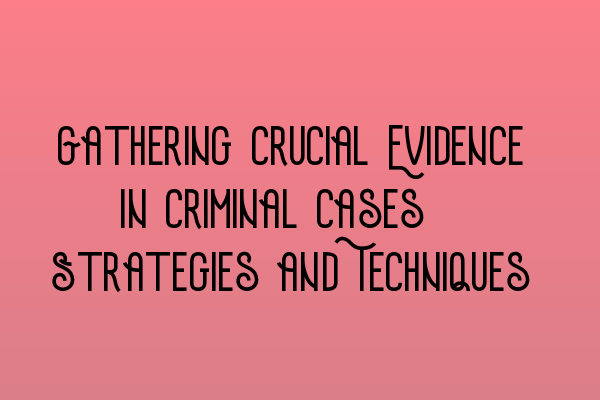Gathering Crucial Evidence in Criminal Cases: Strategies and Techniques
When it comes to criminal cases, gathering crucial evidence is paramount for building a strong defense or prosecution. The outcome of a case often relies heavily on the quality and admissibility of the evidence presented in court. In this article, we will dive deep into the strategies and techniques that lawyers can employ to gather crucial evidence that can make or break a criminal case.
The Importance of Evidence in Criminal Cases
Before we explore the strategies, it’s essential to understand why evidence plays such a pivotal role in criminal cases. Evidence serves as the foundation upon which a case is built. It helps establish facts, prove or disprove elements of a crime, and persuade the judge and the jury of the defendant’s guilt or innocence.
Now, let’s delve into the strategies and techniques that can help lawyers gather crucial evidence:
1. Conduct Thorough Interviews and Interrogations
One of the primary ways to gather evidence is through interviews and interrogations. Lawyers need to skillfully question witnesses, victims, and suspects to extract valuable information. By conducting thorough interviews, lawyers can uncover previously unknown facts, establish alibis, or identify potential witnesses.
SQE 1 Preparation Courses can provide aspiring lawyers with the necessary skills to conduct effective interviews and obtain crucial evidence.
2. Collect and Analyze Physical Evidence
Physical evidence plays a pivotal role in criminal cases. Lawyers must meticulously collect, preserve, and analyze physical evidence to unravel the truth. This can include DNA samples, fingerprints, weapon analysis, or any other tangible evidence that can link the accused to the crime scene.
By enrolling in SQE 2 Preparation Courses, lawyers can gain the necessary knowledge and expertise to collect and analyze physical evidence effectively.
3. Utilize Digital Forensics
In today’s digital age, digital evidence can be vital in criminal cases. Lawyers need to specialize in digital forensics to collect and examine evidence from computers, smartphones, social media accounts, and other digital platforms. This can help establish an electronic trail, uncover hidden information, or refute false claims.
SRA SQE Exam Dates can provide aspiring lawyers with an opportunity to test their knowledge of digital forensics.
4. Conduct Comprehensive Research
Thorough research is a fundamental aspect of gathering crucial evidence. Lawyers need to dig deep into case law, statutes, regulations, and other legal resources to find precedent, legal loopholes, or alternative arguments that can strengthen their case. Research also involves exploring databases, public records, and other reliable sources for relevant information.
For comprehensive legal research, lawyers can utilize SQE 1 Practice Exam Questions to sharpen their research skills.
5. Collaborate with Experts and Specialists
Expert witnesses and specialists can provide invaluable assistance in gathering crucial evidence. Their specialized knowledge and expertise can shed light on complex technical or scientific matters, making it easier for lawyers to present their case effectively. Collaborating with experts can further strengthen the evidence presented in court.
SQE 1 Practice Mocks FLK1 FLK2 can help equip lawyers with the skills to collaborate effectively with experts and specialists.
Conclusion
Gathering crucial evidence is a critical aspect of criminal cases. Lawyers must employ various strategies and techniques to collect, analyze, and present evidence that can support their case. By conducting thorough interviews, collecting and analyzing physical and digital evidence, conducting comprehensive research, and collaborating with experts, lawyers can build a strong defense or prosecution. Enhancing these skills through the SQE Criminal Law & Practice Law UK can significantly benefit aspiring lawyers in their quest for justice and truth.
